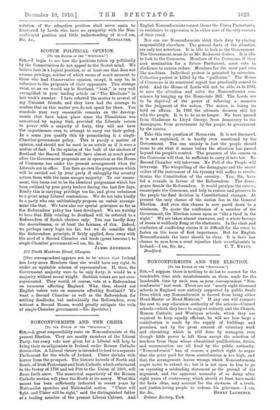SCOTCH POLITICAL OPINION.
[To THE EDITOR OF THE " SPECTATOR."] Sin,—I begin to see how the positions taken up politically by the Conservatives do not appeal to the Scotch mind. We believe here in a logical position, or at least one that does not assume privilege, neither of which seems of much moment to those who lead Conservative opinion, except, it may be, in reference to the proposals of their opponents. This strange twist, or, as we would say in Scotland, " kink," is very well exemplified in your leading article on "The Elections" in last week's number. I have referred the matter to several of my Unionist friends, and they have had the courage to confess that on this matter you do not speak for them. You conclude your very reasonable remarks on the develop- ments that have taken place since the Dissolution was announced by saying that, provided the Liberals return to power with a majority of forty, they will not have the impertinence even to attempt to carry out their policy. In a sense you qualify this by pronouncing it a single- Chamber-government policy. This is purely a matter of opinion, and should not be used in an article as if it were a matter of fact. In the opinion of the bulk of the electors of Scotland the Second House will have almost as much power after the Government proposals are in operation as the House of Commons has under the present arrangement when the Liberals are in office. You then go over the programme which will be carried out by your party if unhappily the country return them with the same meagre majority. To our amaze- ment, this turns out to be the identical programme which has been outlined by your party leaders during the last few days. Really this is carrying privilege too far, and gives substance to a great many Liberal contentious. We do not take kindly to a party who can unblushingly propose an unfair arrange- ment like that. We have also our special grievance so far as the Referendum policy has been developed. We are waiting to hear that Bills relating to Scotland will be referred to a Referendum of Scotch electors only. You can hardly deny the desirableness, or at least the fairness, of this. Indeed, we perhaps carry logic too far, but we do consider that the Referendum principle, if fairly applied, does away with the need of a Second Chamber and leads (great heavens !) to single-Chamber government.—I am, Sir, &c., 121 North Montrose Street, Glasgow.
JAMES ANDERSON.
[Our correspondent appears not to be aware that Ireland has forty more Members than she would have any right to under an equitable scheme of representation. If, then, the Government majority were to be only forty, it would be a majority without moral weight. Scottish voters are not over- represented. They would, of course, vote at a Referendum on measures affecting England. Why, then, should not English voters vote on measures affecting Scotland P We want a Second Chamber as well as the Referendum for settling deadlocks, but undoubtedly the Referendum, even without a Second House, would greatly mitigate the evils of single-Chamber government. —En. Spectator.]


























































 Previous page
Previous page